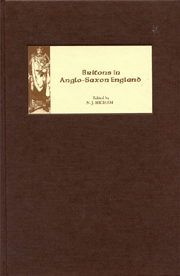Book contents
- Frontmatter
- Contents
- List of Illustrations
- List of Tables
- Contributors
- Dedication
- Acknowledgements
- Abbreviations
- 1 Britons in Anglo-Saxon England: An Introduction
- 2 Anglo-Saxon Attitudes
- 3 Forgetting the Britons in Victorian Anglo-Saxon Archaeology
- 4 Romano-British Metalworking and the Anglo-Saxons
- 5 Invisible Britons, Gallo-Romans and Russians: Perspectives on Culture Change
- 6 Historical Narrative as Cultural Politics: Rome, ‘British-ness’ and ‘English-ness’
- 7 British Wives and Slaves? Possible Romano-British Techniques in ‘Women's Work’
- 8 Early Mercia and the Britons
- 9 Britons in Early Wessex: The Evidence of the Law Code of Ine
- 10 Apartheid and Economics in Anglo-Saxon England
- 11 Welsh Territories and Welsh Identities in Late Anglo-Saxon England
- 12 Some Welshmen in Domesday Book and Beyond: Aspects of Anglo-Welsh Relations in the Eleventh Century
- 13 What Britons Spoke around 400 AD
- 14 Invisible Britons: The View from Linguistics
- 15 Why Don't the English Speak Welsh?
- 16 Place-Names and the Saxon Conquest of Devon and Cornwall
- 17 Mapping Early Medieval Language Change in South-West England
- Index
14 - Invisible Britons: The View from Linguistics
Published online by Cambridge University Press: 12 September 2012
- Frontmatter
- Contents
- List of Illustrations
- List of Tables
- Contributors
- Dedication
- Acknowledgements
- Abbreviations
- 1 Britons in Anglo-Saxon England: An Introduction
- 2 Anglo-Saxon Attitudes
- 3 Forgetting the Britons in Victorian Anglo-Saxon Archaeology
- 4 Romano-British Metalworking and the Anglo-Saxons
- 5 Invisible Britons, Gallo-Romans and Russians: Perspectives on Culture Change
- 6 Historical Narrative as Cultural Politics: Rome, ‘British-ness’ and ‘English-ness’
- 7 British Wives and Slaves? Possible Romano-British Techniques in ‘Women's Work’
- 8 Early Mercia and the Britons
- 9 Britons in Early Wessex: The Evidence of the Law Code of Ine
- 10 Apartheid and Economics in Anglo-Saxon England
- 11 Welsh Territories and Welsh Identities in Late Anglo-Saxon England
- 12 Some Welshmen in Domesday Book and Beyond: Aspects of Anglo-Welsh Relations in the Eleventh Century
- 13 What Britons Spoke around 400 AD
- 14 Invisible Britons: The View from Linguistics
- 15 Why Don't the English Speak Welsh?
- 16 Place-Names and the Saxon Conquest of Devon and Cornwall
- 17 Mapping Early Medieval Language Change in South-West England
- Index
Summary
Introduction
IT has long been believed that the Britons of what became England were effectively exterminated – whether killed, driven out and/or culturally effaced by enslavement – by the incoming Anglo-Saxons; the basis for this belief was essentially derived from the documentary record. Over recent years, a competing view has arisen on the basis of a more critical assessment of the historical record as English foundation-mythmaking: that the Britons did not wholly disappear in any of these ways but that many ‘became English’ by taking on English practices, including the English language. This paper shows that the new view is not tenable in the light of what generally happens to languages involved in contact situations and that, at least in the English heartland, the observed patterns of lexical and onomastic borrowing suggest that the traditional view is more likely to be correct.
The Angles, Saxons and other peoples did not enter an empty landscape when they hauled their ships up on British beaches in the fifth century with the intention, for the first time, of carrying out more than a simple raid. The land was occupied by people speaking a Celtic language ancestral to Welsh and Cornish; scholars call it British during the Roman period and Brittonic after a large number of important changes affected it around the years 450–600 CE. There is little direct evidence that Latin was a flourishing spoken language anywhere in what would later become England, though it was of course the language of epigraphy and of writing in general.
- Type
- Chapter
- Information
- Britons in Anglo-Saxon England , pp. 172 - 191Publisher: Boydell & BrewerPrint publication year: 2007

